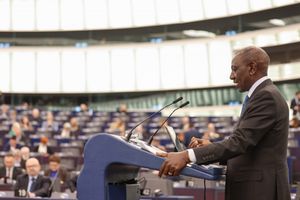
President William Ruto addresses the nation at State House in Nairobi.
President William Ruto may have been caught up in the politics surrounding the November presidential election in the United States, leading to the rejection of an invite to address a joint sitting of Congress.
US Congress Speaker Mike Johnson – a known ally of Republican presidential candidate Donald Trump – declined the request by President Ruto, who will be in Washington on the invitation of the White House on May 23.
Committee Chairman Michael McGaul and Ranking Member Gregory W Meeks had written to Speaker Johnson asking him to send a formal invite to Nairobi to coincide with Dr Ruto’s state visit to the US.
In turning down the request, Mr Johnson’s Deputy Chief of Staff, Raj Shah, cited scheduling constraints and security hassles in making arrangements for the address.
The Speaker, however, granted President Ruto time for a one-on-one engagement during the state visit.
“We have offered the Kenyan embassy more than 90 minutes of engagement, including a one-on-one visit with Speaker Johnson, bipartisan leadership meeting with Speaker Johnson, Leader Jeffries and committee chairmen and ranking members, and a bicameral meeting,” Mr Shah said.
“Due to scheduling restraints, we could not accommodate a request for remarks before a Joint Session.”
Macharia Munene, a professor of History and International Relations, links the decision to the November 5 elections.
He says though the invite was done by two members of the House, President Biden must have been keen on it.
“You have to look at the decline in terms of politics in the United States. This is an election year and the Speaker is Republican,” Prof Munene said, adding that there could also have been concerns about Dr Ruto’s previous case at the International Criminal Court.
Prof Gilbert Khadiagala, Director of the University of Witwatersrand’s African Centre for the Study of the United States, described such an invite as a special event for any visiting head of state “because it symbolises proximity to American power and prestige”.
“Johnson is a Speaker under siege from the radical wing of the Republican party. He has made many compromises to this wing. He wants to get back to the good graces of this right wing, which is essentially racist and anti-foreign,” Prof Khadiagala said.
“The invitation to an African president to Congress would almost be blasphemous to the group. Johnson had to cave in because it is rare for visiting presidents to speak to Congress. The privilege is granted to very few leaders.”
President Ruto would have been the second African leader to address Congress after then-Liberian head Ellen Johnson Sirleaf in 2006.
David Monda, Professor of Political Science at the City University of New York, says it is unfortunate that Dr Ruto has inadvertently been caught up in the Republican-Democrats tussle.
“The Republican Speaker is under fire from the right wing of his party – the Freedom Caucus – that feels he supports too many initiatives pushed by Democrats. Rejecting this joint address request, is one way for him to reassert his independence,” Prof Monda said.
The rejection of the invite has seen the Speaker criticised by President Biden’s Democrat-leaning politicians. Ways and Means Committee Ranking Member, Richard E. Neal, said Mr Johnson failed to recognise the importance of the US-Kenya ties.
“Africa and its people helped shape our great nation, allowing it to become the superpower it is. Strengthening relations across the continent, including with a strategic partner like Kenya, is of importance to our shared economic aspirations and democratic values,” Mr Neal said.
He added that the continent deserves the same level of respect given to US partners in other parts of the world.
“The Republican leadership has invited (Japanese) Prime Minister Fumio Kishida, (Israeli) President Isaac Herzog, (India’s) Prime Minister Narendra Modi and (South Korean) President Yoon Suk-yeol to address joint meetings of Congress during their official visits to the United States. I see no reason President William Ruto’s upcoming state visit should be different,” he added.
He said that he hosted former Kenyan President Uhuru Kenyatta, where they spoke about strengthening the US-Kenya relations.
“With the Biden administration already rising to the rightful occasion by hosting a state dinner, the Congress must do the same,” he said.
Congresswoman Terri Sewel joined the chorus criticising Mr Johnson.
“Kenya is a close ally and a democratic partner. The Biden administration values the role Kenya and the African continent will play in shaping the 21st century,” she said.
“Speaker Johnson must extend the same respect to Kenya that is given to other parts of the world.”
Such an invitation to the US Congress could have shown confidence in Kenya’s new leadership at a time Washington has struggled to whip its usual allies to a common stand, some analysts say.
President Ruto’s trip to the US will come as Washington pushes allies to stand against Russia’s invasion of Ukraine. The US has struggled to defend Israel in the face of the Gaza bloodbath.
Nairobi has stood with Washington in the two situations, even though it also raised concerns about human rights violations in Gaza.








